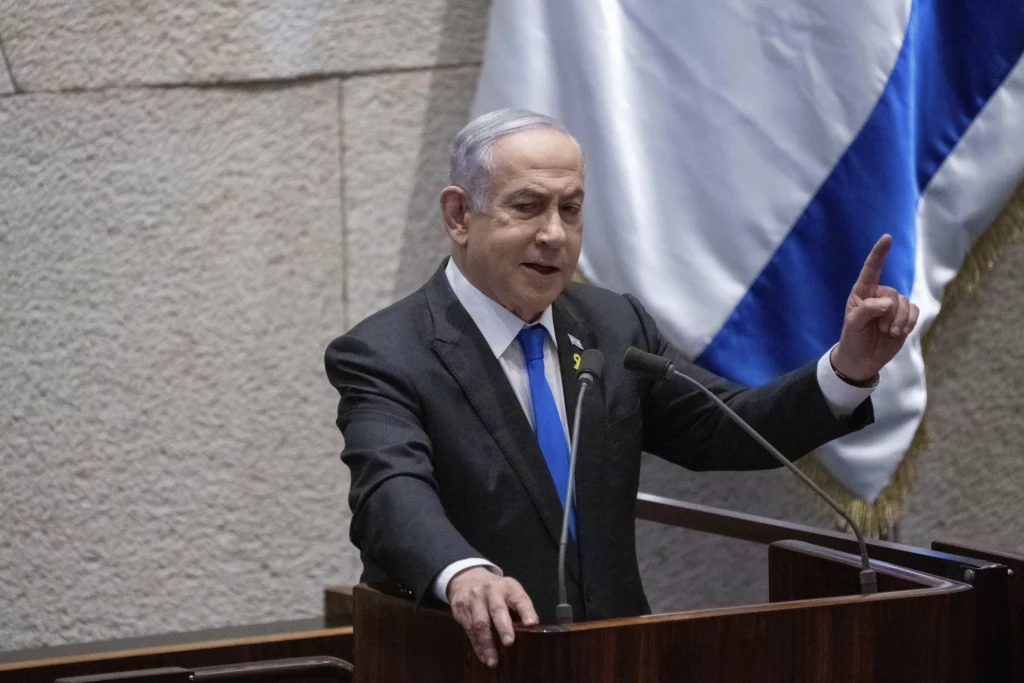
The families of the Americans held hostage by Hamas in Gaza have urged lawmakers to push Israeli Prime Minister Benjamin Netanyahu to agree to a ceasefire deal that would return their loved ones.
Israel and Hamas are believed to be close to agreeing to a ceasefire, though the two sides have yet to come to a deal as is set to address both chambers of Congress on Wednesday.
Eight Americans, not all of whom are alive, are believed to be held by Hamas, which kidnapped roughly 250 people during its Oct. 7 terrorist attack, and the relatives of several of them spoke at a congressional roundtable event Tuesday with the House Foreign Affairs Committee.
“I believe at this point, as an Israeli American, that any true friend of Israel today must pressure our prime minister to finish the deal now,” Jonathan Dekel-Chen, the father of Sagui Dekel-Chen, told the committee.
Daniel Neutra, whose brother Omer is among the hostages, added that the families met with Netanyahu on Tuesday, and “the urgency of the matter did not seem to resonate with him.”
“We must continue to put pressure on all parties involved, including Hamas, to accept this deal now before more people die in captivity,” he added.
Netanyahu is expected to receive a warm welcome from the Republican Party, while dozens of Democrats are already expected to boycott his address given the Israeli military’s conduct in the war. Vice President Kamala Harris, now the presumptive Democratic presidential nominee for November’s election, will not attend either, though the officials will meet later this week. Netanyahu is also expected to meet with President Joe Biden and former President Donald Trump.

Efrat Moshkoviz, the aunt of Naama Levy, who was filmed on Oct. 7 getting dragged out of a jeep bloodied in the crotch area, will be in the audience for Netanyahu’s address.
“I want Netanyahu to look us in the eyes and tell us, and he’s doing everything he can, and the deal is right around the corner,” Moshkoviz told the Washington Examiner, though she acknowledged that the families had hoped a ceasefire deal would’ve been announced prior to his address.
“We were hoping that would be the case before he addresses Congress altogether, but at the very least here,” Moshkoviz said, she wants to hear “a very specific commitment to getting the deal done, to finding that path that will seal the deal in a matter of not even hours days imminent, and that’s that’s what we’re looking for.”
The committee also heard directly from Aviva Siegel, who was held hostage for more than seven weeks and was among the roughly 100 hostages who were freed during the weeklong ceasefire at the end of November. Her husband, Keith, is still being held by Hamas.
“I was in Gaza for 51 days, and I saw everything. I felt everything. We need to bring them back. We cannot allow ourselves, as humans, let them go through one more day like I went through,” she said. “I was starved while they ate in front of me. I was thirsty because I didn’t get any water. I was not allowed to stand or walk or move. Most of the time, I had to keep silent completely.”
“It’s so difficult to think about what more we were going to go through and what the girls are going through. Now I’m here thinking about Keith and the girls, and it’s too much for me to handle,” Siegel added. “Because I know where they are, and I know who they are with.”
Biden said on July 11 that Israel and Hamas had “agreed” to the “framework” of the proposal he laid out publicly back on May 31.
“I believe we’re inside the 10-yard line and driving toward the goal line in getting an agreement that would produce a ceasefire, get the hostages home, and put us on a better track to trying to build lasting peace and stability,” Secretary of State Antony Blinken said during the Aspen Security Forum last Friday.
The proposal Biden laid out, which has been supported by several Western governments, includes three phases, the first of which would last roughly six weeks. During that time, Israeli forces would withdraw from densely populated areas of Gaza, the fighting would cease, a surge of humanitarian aid would flow into the strip, Hamas would release some of the hostages, women and children, while Israel would release a significantly higher number of Palestinians in Israeli detention.
During the first phase, the two sides would be able to hammer out the specific details of the second phase though it would broadly include the release of all remaining living hostages and the withdrawal of all Israeli forces from Gaza.
CLICK HERE TO READ MORE FROM THE WASHINGTON EXAMINER
The final stage would include the start of the reconstruction of Gaza and the return of the deceased hostages.
Israeli President Isaac Herzog declared on July 7, the nine-month anniversary of the Oct. 7 attack, that an “absolute majority” of the country supports a ceasefire deal that secures the release of the remaining hostages.






